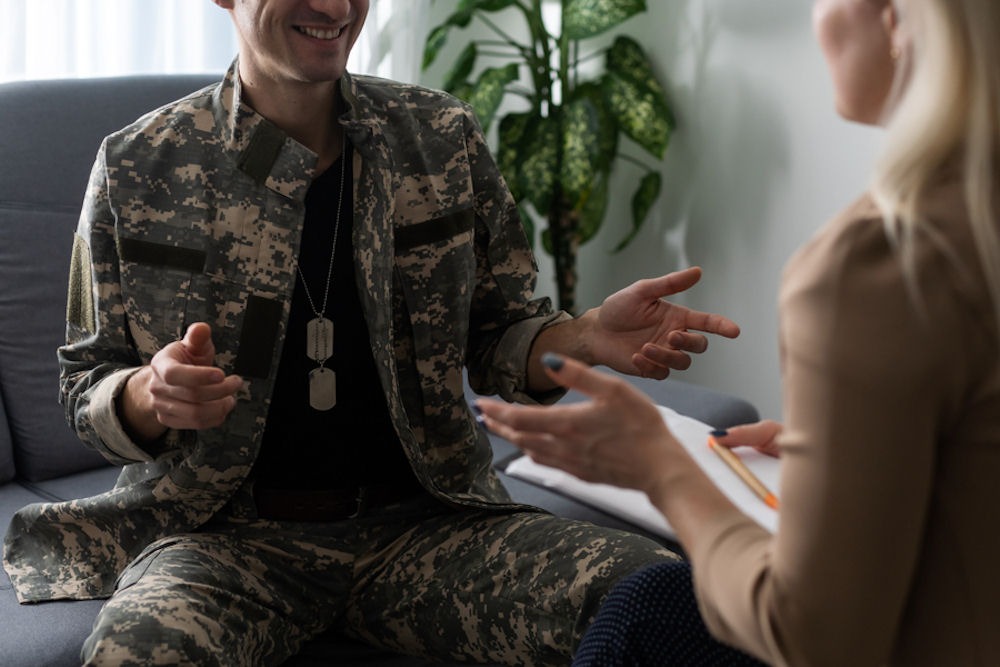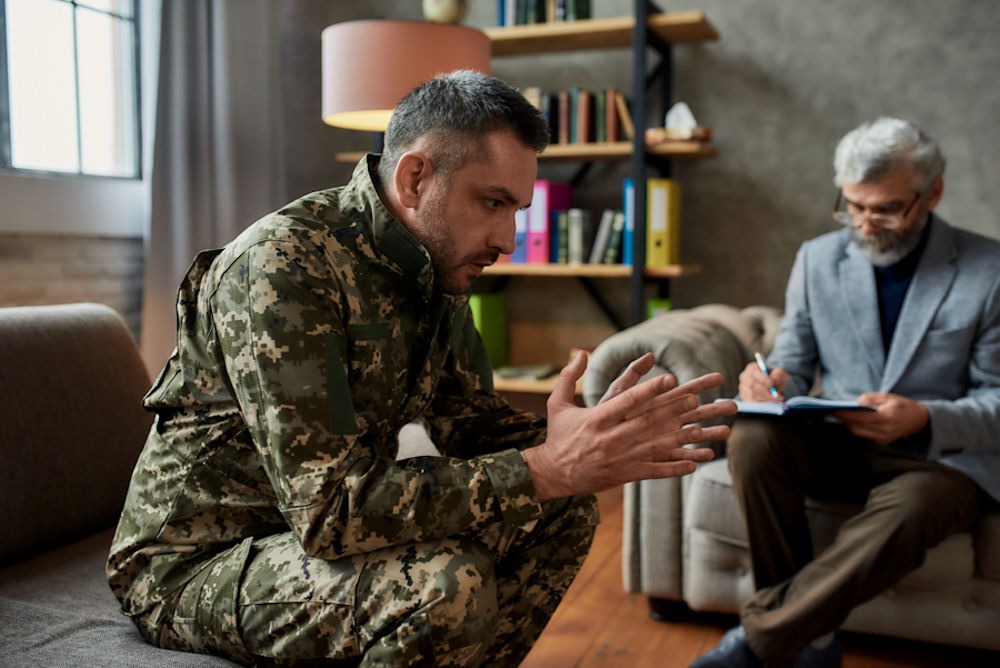When we talk about veterans, we often hear stories of bravery, sacrifice, and resilience. Books, movies, TV Shows, and documentaries always show soldiers putting their all into fighting for their countries before going home to loving families and pets. The stark reality is that another side to their journey doesn’t always make the headlines: the invisible battles many face after returning home. PTSD, or post-traumatic stress disorder, is a reality for countless veterans, shaping their lives in ways that aren’t always easy to see.
From the intensity of combat to the challenges of reintegrating into civilian life, the experiences of service can leave lasting marks. How common is PTSD among those who’ve served? And what does it mean for the men and women who carry this weight? In this blog, we’ll delve into the realities of PTSD in veterans, exploring the numbers, the stories, and the paths to healing. Understanding is the first step toward supporting those who’ve given so much.
What Exactly is PTSD, and Why Does It Affect Veterans So Often?
PTSD, or post-traumatic stress disorder, is a mental health condition that can develop after someone goes through a deeply distressing or life-threatening event. For veterans, this often stems from experiences during combat, witnessing violence, or even the high-stress environment of deployment. These situations can leave a lasting emotional imprint, making it hard to feel safe or move forward.
PTSD hits veterans so hard because military life is unique. It’s the constant pressure, the loss of comrades, and the challenge of reintegrating into civilian life afterward. The bond between service members is incredibly strong, so losing a teammate or feeling responsible for something that happened can weigh heavily for decades afterward.
What Are Some Statistics on Challenges Faced By Veterans?
Here’s a breakdown of key statistics and insights about substance abuse, mental health, and other challenges faced by veterans. These stats shed light on the struggles many veterans face and the resources available to help them.
- 11% of veterans seeking treatment at VA facilities have a substance use disorder (SUD), with alcohol being the most commonly abused substance.
- 1 in 15 veterans struggle with alcohol dependency, and 25% of veterans with PTSD also have a substance use disorder.
- Veterans are more likely to misuse prescription opioids, often due to chronic pain from service-related injuries.
- 41% of veterans need mental health care annually, with PTSD, depression, and anxiety being the most common issues.
- 23% of veterans using VA care have experienced PTSD at some point, and those with PTSD are 3-4 times more likely to develop a substance use disorder.
- Veterans are 5 times more likely to experience major depression than civilians.
- In 2022, there were 6,407 veteran suicides, averaging 17.6 per day. Veterans are one and a half times more likely to go out by suicide than civilians.
- 71% of male veterans and 43% of female veterans who died by suicide used firearms.
- Veterans with substance use disorders are at a higher risk of suicide, with 30% of suicides involving substance abuse.
- Over 37,000 veterans were homeless in 2020, and 74% of homeless veterans have a substance use disorder.
- Homelessness is often linked to mental health struggles, unemployment, and difficulty reintegrating into civilian life.
- Nearly half of veterans use VA healthcare, and 75% also have health insurance.
- Veterans with mental health conditions, especially PTSD, are more likely to use VA services.
- Over 5 million veterans received disability compensation in 2020.
- Female veterans are 2.2 times more likely to die by suicide than civilian women, and they face higher rates of PTSD and sexual trauma.
- 43% of female veterans using VA care are diagnosed with mental illness, with depression being the most common.
- LGBTQ veterans face higher rates of anxiety disorders, depression, and discrimination, with half reporting discrimination at VA facilities.
- Many LGBTQ veterans avoid seeking care due to stigma, which can worsen mental health outcomes.
What Are the Early Signs of PTSD in Veterans and How Can They Seek Help?

PTSD can creep in slowly, showing up in ways that might not be obvious at first. Here are some early signs to look out for and ways to seek help:
- Sleep Feels Impossible. Nightmares, tossing and turning, or waking up on high alert can make getting adequate rest feel like a battle.
- Flashbacks or Intrusive Memories. Certain sounds, smells, or places can pull you right back into a harrowing combat moment, making your past feel like it’s happening all over again.
- Irritability or Anger Outbursts. Small things that never used to matter might suddenly trigger frustration or rage and make you lash out.
- Feeling Numb or Disconnected. Struggling to feel happiness, love, or even just a sense of being present in the moment.
- Avoiding Certain Places or People. Staying away from crowds, loud noises, or anything that brings up painful memories.
- Always on Edge. Feeling jumpy, scanning rooms for exits, or strong reactions to unexpected noises.
- Guilt or Self-Blame. Thoughts like “I could have done more” or “Why didn’t others make it instead of me?” can weigh heavy on your mind.
Why Do Some Veterans Develop PTSD While Others Don’t?
PTSD doesn’t affect every veteran the same way, and there’s no definitive reason why some develop it while others don’t. It’s a mix of personal, situational, and even biological factors. Here’s a breakdown of what might play a role:
- Type of Trauma: The intensity and nature of the experience matter. Veterans exposed to prolonged combat, life-threatening situations, or the loss of comrades are often at higher risk.
- Frequency of Exposure: Multiple deployments or repeated exposure to traumatic events can increase your chances of developing PTSD.
- Support Systems: Veterans with strong connections, such as family, friends, or fellow service members, might cope better than those who feel isolated.
- Pre-existing Mental Health: Someone with a history of anxiety, depression, or other mental health challenges might be more vulnerable.
- Coping Mechanisms: The way you process stress or trauma can affect your ability to handle it. If you have healthier coping strategies, you may better handle the stress.
- Biological Factors: Genetics and brain chemistry can influence how you respond to trauma.
- Training and Preparedness: Your level of mental and emotional preparation for high-stress situations can shape how you react during and after trauma.
- Reintegration Challenges: Struggling to adjust to civilian life after service can amplify stress and trigger PTSD symptoms.
What Is The Importance Of Specialized Treatment For Veterans?
Transitioning from military service to civilian life can be a challenging journey for veterans, often accompanied by unique physical and mental health issues. Specialized treatment programs are beneficial and essential in addressing these distinct needs. Here’s why:
Veterans face specific issues, such as PTSD, substance abuse, and depression, stemming from their service experiences. Specialized programs, such as rehab for veterans, are designed to address these challenges effectively.
Comprehensive care that combines mental health support with medical treatment ensures veterans receive holistic support, crucial for conditions like PTSD and substance use disorders.
Providers trained in military culture can build better rapport with veterans, leading to more effective communication and personalized treatment plans.
Many veterans experience multiple health issues simultaneously. Specialized programs are equipped to treat co-occurring disorders, improving overall outcomes.
Veteran-specific services often include assistance with navigating benefits, housing, and employment, aiding in a smoother transition to civilian life.
Engaging with fellow veterans in treatment creates a sense of community, reducing feelings of isolation and promoting shared healing experiences.
What Resources Are Available to Help Veterans Cope with PTSD?

Plenty of resources exist to help with healing, support, and reconnecting with life. Below are some of the most impactful ones:
- VA Mental Health Services. The U.S. Department of Veterans Affairs offers therapy, counseling, and treatment programs specifically for PTSD.
- Veterans Crisis Line. This free, 24/7 support line connects veterans with trained responders for moments when things feel overwhelming.
- Make the Connection – Real stories from veterans, plus tools for coping with PTSD. Hearing from others who have been there can make a huge difference.
- Wounded Warrior Project. This organization offers peer support groups, mental health programs, and outdoor retreats to help veterans heal in a community setting.
- Vet Centers. These community-based counseling centers provide free services for combat veterans, including trauma therapy programs, group sessions, and family support. Find a nearby location at Vet Centers.
- Apps for Mental Health. Mobile apps like PTSD Coach (created by the VA) provide self-help tools, relaxation techniques, and ways to track symptoms right from a phone. It’s available for free on iOS or Android.
- Support from Fellow Veterans. Sometimes, the best support comes from those who’ve walked the same path. Organizations like Team RWB and The Mission Continues focus on building connections through fitness, volunteering, and community events.
Can PTSD in Veterans Lead to Other Mental Health Challenges?
PTSD can open the door to other mental health challenges for veterans. Here’s how:
- Depression: The weight of traumatic memories can make you perennially sad and completely uninterested in your old hobbies.
- Anxiety Disorders: Hypervigilance and constant worry often accompany PTSD, making daily life feel infinitely more challenging to navigate.
- Substance Use Disorders: Some veterans turn to alcohol or drugs to numb their pain, leading to dependency issues.
- Traumatic Brain Injury (TBI): Physical injuries from service can overlap with PTSD, complicating diagnosis and treatment.
- Suicidal Thoughts: The overwhelming nature of PTSD symptoms can lead some veterans to contemplate self-harm.
Is There a Connection Between PTSD and Substance Abuse in Veterans?
PTSD and substance abuse often go hand-in-hand for many veterans. Here’s how they’re connected:
- Self-Medication: To numb the distressing symptoms of PTSD, some veterans turn to alcohol or drugs as a coping mechanism.
- Increased Risk: Veterans with PTSD are more likely to develop substance use disorders, and vice versa.
- Compounded Challenges: Dealing with both PTSD and substance abuse can make recovery more complex, as each condition can intensify the other.
- Integrated Treatment: A PTSD recovery program often involves addressing both issues simultaneously through specialized programs designed for co-occurring disorders.
Arkview Recovery Offers Specialized Veteran Treatment In PA
Arkview Recovery, located in Mechanicsburg, Pennsylvania, is dedicated to providing addiction treatment for veterans in PA. We recognize the unique challenges that veterans face, so our comprehensive approach integrates mental health support with addiction therapy programs, ensuring a holistic path to recovery. As a Psyche Armor certified provider, Arkview Recovery is committed to delivering culturally sensitive and effective treatment and building a sense of community through peer support groups and individualized counseling.
Our experienced team collaborates closely with each veteran to develop personalized treatment plans, addressing both substance use disorders and co-occurring mental health conditions. For veterans seeking a supportive and understanding environment, Arkview Recovery offers the resources and care necessary to navigate the journey to recovery. Contact us today.

Kyle is Lead Therapist at Arkview Recovery Center. He holds a Master of Social Work degree from Temple University and is a Licensed Clinical Social Worker. He has years of experience working directly with individuals who suffer from addiction and mental health disorders. Being in long term recovery himself, Kyle is very passionate about the recovery process. He is heavily involved in the local recovery community in which he enjoys his commitments to service and giving back. His specialty is in group therapy and developing clinical staff. Kyle brings to Arkview a holistic approach to recovery, specializing in mindfulness, reality therapy, and solution-focused therapy.







